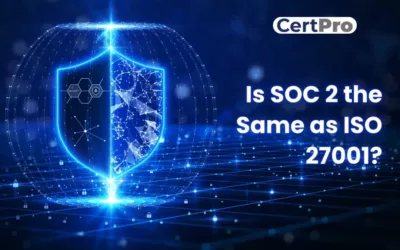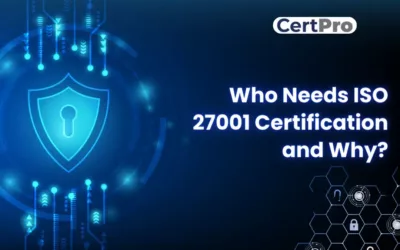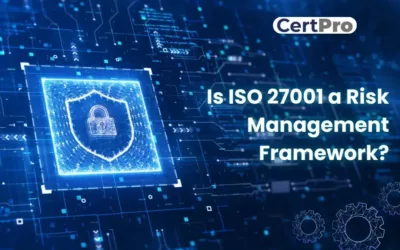ISO 27001:2022
INFORMATION SECURITY MANAGEMENT SYSTEM
Organizations facing the complicated world of cybersecurity hazards might find guidance from the ISO 27001 Information Security Management Systems Certification. Businesses are at the vanguard of a never-ending fight to protect their most valuable asset: information, in a time defined by the unrelenting barrage of cyber threats and data breaches. The growth of digital operations has exacerbated these issues, as hackers continually devise new ways to corrupt sensitive data and exploit vulnerabilities, such as phishing attacks and ransomware.
Organizations everywhere are relying on ISO 27001, the internationally known standard that describes the requirements of an efficient information security management system (ISMS), as a result of realizing the hazards that these systems pose. Stronger defenses against cyberattacks, data breaches, and information theft are the goals of this painstakingly organized architecture, which includes an extensive suite of policies, procedures, processes, and technologies.
ISO 27001 stimulates organizational resilience and regulatory compliance while also providing a strategy for controlling and reducing information security threats. Organizations can facilitate the creation of strong business continuity and disaster recovery plans while strengthening their capacity to manage complex data protection rules by complying with ISO 27001 standards. ISO 27001 certification further demonstrates a company’s unwavering commitment to maintaining the highest standards of information security. In addition to providing a business with a competitive advantage in today’s highly competitive economy, ISO 27001 certification also cultivates trust and confidence among customers and stakeholders.
Organizations can successfully prioritize threats by adopting ISO 27001’s risk-based strategy, which also promotes a continuous improvement culture. For enterprises trying to make their way through the complexity of today’s digital ecosystem, ISO 27001 is still a vital resource due to its widespread recognition and emphasis on proactive risk management.

Certification and Auditing Services by CertPro
At CertPro, we understand the importance of information security and the significance of ISO 27001:2022 certification for organizations seeking to safeguard their sensitive data. We offer end-to-end support to organizations striving for ISO 27001:2022 certification. Our team of experienced professionals will guide you through the entire certification process, ensuring that your organization’s information security practices align with the latest standards set forth by ISO. We will collaborate closely with your team to develop and implement an effective ISMS, tailored to your specific needs and industry requirements.
Why Choose CertPro for ISO 27001:2022 Certification and Auditing?
CertPro stands out as a trusted partner in the realm of ISO 27001:2022 certification and auditing services. With nearly 10+ years of expertise in the industry, we have honed our skills and gained valuable insights into the intricacies of information security management. Here are some compelling reasons why you should choose CertPro:
| Factors | CertPro Advantage |
| Time to Certification | 4x faster than traditional approaches |
| Price | Competitive rates with flexible options |
| Process | Streamlined and efficient methodology |
| Expertise | 10+ years of industry experience |
CertPro’s Cost-Effective Approach to ISO 27001:2022 Certification
When considering ISO 27001 certification, the total cost can often be overwhelming, encompassing various factors that influence the overall expenses. We offer a tailored pricing structure based on the number of team members and the time required for certification. With our transparent pricing model, you can easily determine the ISO 27001 certification cost associated with your organization’s size. Here’s a breakdown of our pricing tiers:
| No. of employees | Timeline | Cost (approx.) |
| 1 – 25 | 4 weeks | 3000 USD |
| 25-100 | 6 weeks | 6000 USD |
| 100-250 | 8 weeks | 10000 USD |
| 250 plus | 8-12 weeks | Custom plans |
Why Your Organization Needs ISO 27001:2022 Certification
Obtaining ISO 27001 certification is crucial for organizations, as it offers a structured methodology for managing information security that ensures the confidentiality, integrity, and availability of sensitive data. By acquiring this certification, organizations can showcase their dedication to safeguarding their information assets and adhering to regulatory requirements. In essence, ISO 27001 certification is a significant investment for companies to protect their valuable information assets and ensure uninterrupted business operations.
Purpose and Scope of ISO 27001: 2022 Compliance
ISO 27001 offers a framework for managing and safeguarding an organization’s information assets, ranging from sensitive data to intellectual property and personal information. It mandates requirements for establishing an Information Security Management System (ISMS) that allows a systematic approach to information security management. The standard helps organizations identify, evaluate, and manage risks to their information assets by implementing security controls that mitigate these risks. ISO 27001 applies to all types and sizes of organizations, and its implementation builds customer trust, facilitates regulatory compliance, and enforces contractual obligations.
The leadership of the organization determines the ISO 27001 scope, which defines the ISMS’s boundaries. It specifies the specific information assets and processes covered by the ISMS and the individuals or groups responsible for implementing and maintaining the system. The scope takes into account the organization’s overall risk management strategy and may include specific departments, locations, or information systems, as well as third-party vendors or partners involved in the organization’s information processing activities. By defining the scope of ISO 27001, organizations can focus their information security controls on critical areas and risks, prioritize resources for improving their security posture, and align their security posture with their overall objectives and goals.
The key principles of ISO 27001 compliance
The key principles of ISO 27001 are as follows:
- Information security risk assessment: Organizations must identify and assess the risks to their information assets.
- Security controls: Organizations must implement security controls to mitigate the identified risks.
- Continuous monitoring and improvement: Organizations must monitor and review their information security management system (ISMS) to ensure its effectiveness and continually improve it.
- Legal and regulatory compliance: Organizations must ensure compliance with relevant laws, regulations, and contractual requirements.
- Employee awareness: Organizations must educate and train employees on information security policies and procedures.
- Management commitment: Top management must be committed to the implementation, maintenance, and continual improvement of the ISMS.
- Documentation and record-keeping: Organizations must maintain documentation and records related to their ISMS.
- Internal audits: Organizations must conduct internal audits to assess their compliance with the standard and identify areas for improvement.
- Management reviews: Top management must conduct periodic reviews of the ISMS to ensure its continued suitability, adequacy, and effectiveness.
- Continuous improvement: Organizations must continually improve their ISMS based on the results of internal audits, management reviews, and changes in the organization’s risk profile.
Requirements for ISO 27001:2022 compliance
ISO 27001 defines a series of criteria that organizations must meet to establish, implement, maintain, and continuously enhance an Information Security Management System (ISMS). These requirements include:
1. Risk assessment: The organization must conduct a systematic and thorough risk assessment to identify and evaluate the risks to the confidentiality, integrity, and availability of its information assets. The risk assessment should take into account the likelihood and potential impact of each risk.
2. Risk treatment: Based on the results of the risk assessment, the organization must select and implement appropriate controls to mitigate or manage the identified risks. The risk treatment plan should be based on a risk-based approach and take into account legal, regulatory, and contractual requirements.
3. Continuous improvement: The organization must continually monitor and review the effectiveness of its ISMS to identify areas for improvement. It should establish objectives and targets for improvement, implement corrective and preventive actions, and measure and analyze the results of these actions.
4. Documentation and records: The organization must establish and maintain documents and records related to the ISMS, including policies, procedures, and evidence of performance and improvement.
5. Internal audits: The organization must conduct regular internal audits of its ISMS to ensure that it is operating effectively and under the requirements of ISO 27001.
6. Management review: The top management of the organization must periodically review the ISMS to ensure its continued suitability, adequacy, and effectiveness.
7. Control objectives and controls: The organization must establish control objectives and select and implement controls to ensure the confidentiality, integrity, and availability of its information assets. These controls should be based on the results of the risk assessment and take into account legal, regulatory, and contractual requirements.
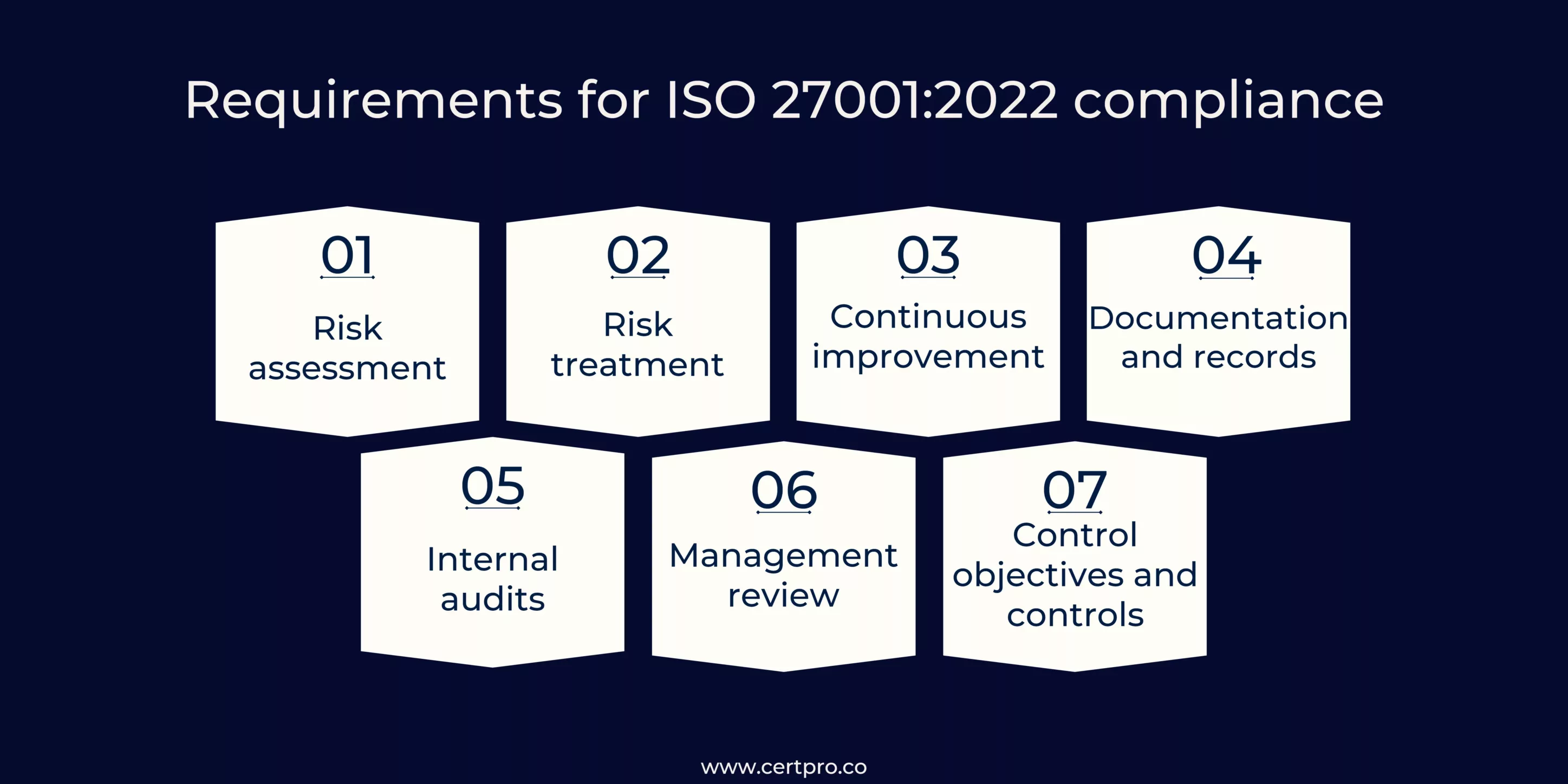
Benefits of ISO 27001 certification
ISO 27001 certification offers several benefits to organizations, including:
1. Enhanced security posture: Implementing the ISO 27001 standard and achieving certification require organizations to establish and maintain a robust Information Security Management System (ISMS). This helps to enhance the organization’s security posture and reduce the risk of data breaches and other security incidents.
2. Compliance with regulations: Compliance with the ISO 27001 standard can help organizations comply with various data protection and privacy regulations, such as the GDPR, HIPAA, and others.
3. Improved customer confidence: ISO 27001 certification provides independent third-party validation of an organization’s information security practices. This can help increase customer confidence and trust in the organization’s ability to protect sensitive information.
4. Competitive advantage: ISO 27001 certification can provide a competitive advantage in the marketplace as it demonstrates the organization’s commitment to information security management.
5. Cost savings: By implementing the ISO 27001 standard and achieving certification, organizations can identify and mitigate information security risks more effectively, potentially leading to cost savings in the long run.
6. Continuous improvement: The ISO 27001 standard requires organizations to continually monitor and improve their information security practices. This helps to ensure that the organization’s security posture remains strong over time and that they stay up-to-date with the latest best practices in information security management.
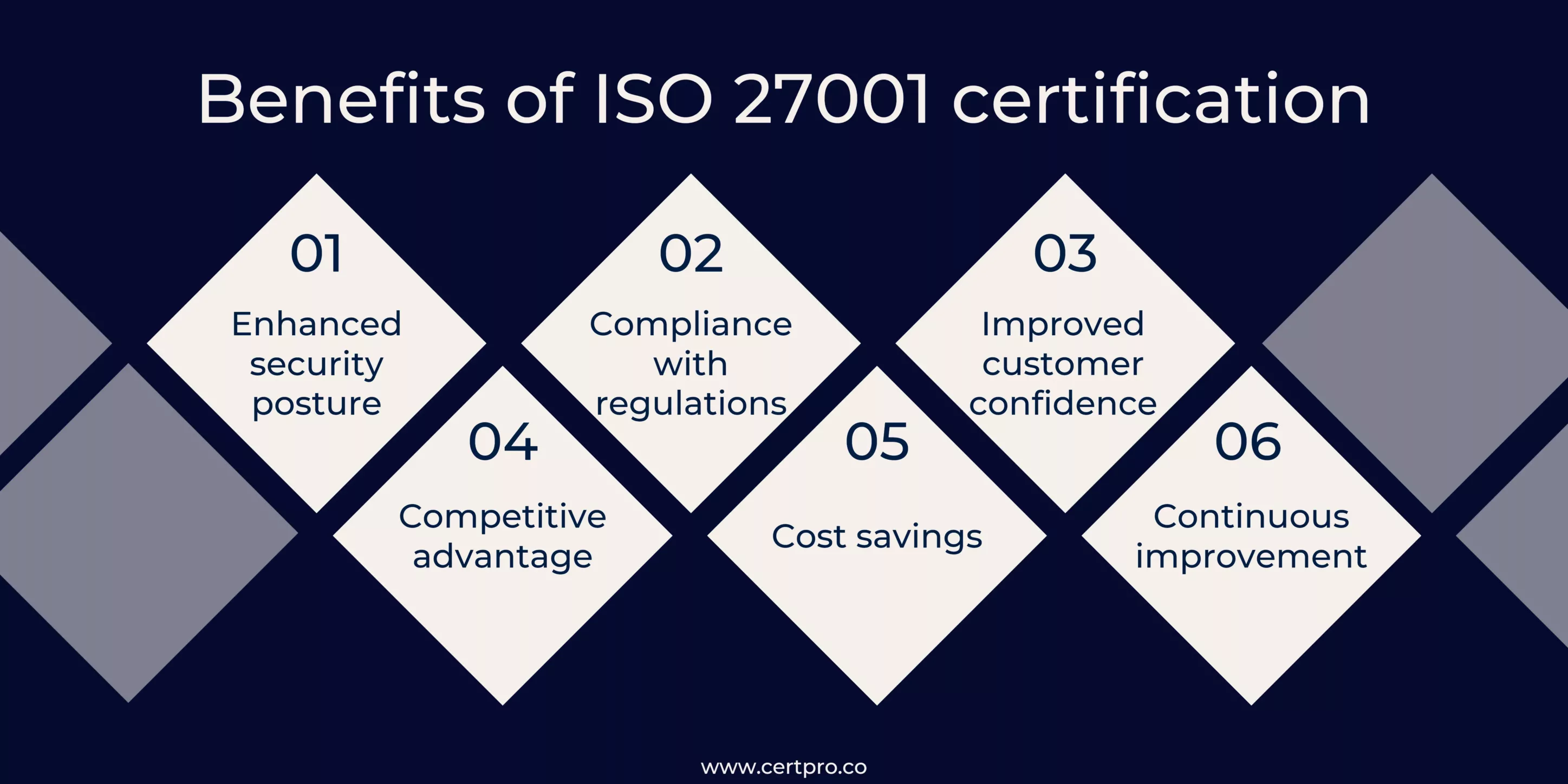
Consequences of non-compliance
- Legal and regulatory penalties: Non-compliance with ISO 27001 can result in legal and regulatory penalties, which can be expensive and damaging to an organization’s reputation.
- Loss of customer trust: ISO 27001 certification demonstrates an organization’s commitment to information security. Non-compliance can lead to a loss of customer trust and damage to the organization’s reputation.
- Data breaches and cyber attacks: Non-compliance with ISO 27001 can increase the risk of data breaches and cyber attacks, which can result in the theft of sensitive information, financial loss, and damage to an organization’s reputation.
- Loss of business opportunities: Many organizations require their suppliers and partners to be ISO 27001 certified. Non-compliance can result in the loss of business opportunities and partnerships.
- Inefficient information security management: Non-compliance with ISO 27001 can lead to inefficient information security management, which can result in additional costs, increased risk, and reduced effectiveness.
Overall, compliance with ISO 27001 standards is essential for organizations to ensure the security of their information assets and protect themselves from the potential risks and consequences of non-compliance.
The audit process for ISO 27001 certification
- Audit planning: Define the scope, objectives, and criteria for the audit.
- Document review: Review the organization’s ISMS documentation to ensure compliance with ISO 27001 certification requirements.
- Online assessment: Conduct an online assessment of the ISMS implementation to verify compliance.
- Reporting and follow-up: Provide a report of the audit findings, including non-conformities, observations, and opportunities for improvement.
- Objectives of the audit: The primary objective of the audit is to determine whether the organization’s ISMS meets the ISO 27001 certification requirements.
ISO 27001 Certification Process
First step: Define the ISMS’s scope: The ISO 27001 standard is extensively used because of its broad applicability to businesses of all sizes and industries. However, implementation varies because each firm has distinct data and security requirements.
Before you begin constructing your Information Security Management System (ISMS), you must first define its scope. Consider which data requires protection and whether the ISMS will cover the entire organization or certain divisions.
Assess security requirements and industry standards to ensure that they are in line with company goals and third-party expectations. If necessary, tailor the ISMS to suit client or industry requirements.
Step 2: Create a Plan: The next step toward compliance is creating a plan to achieve your scope when it has been defined.
To address critical questions from the beginning, a project strategy must be created.
- Who will set the initiative in motion, define goals, and monitor development?
- How are you going to get the backing of stakeholders and leadership?
- When is it planned for the project to start?
- What resources already exist, and what more will you need to get the job done?
- What goals does the organization have for its strategy?
Establishing and defining organizational goals ahead of time can help you coordinate and effectively manage your security implementation efforts.
After you have defined your scope, it is imperative that you assess the controls that are included in your ISMS. The Statement of Applicability (SoA) is the document that contains this assessment. The SoA is a required report that lists all of the Annex A controls that are implemented within the parameters of your company.
Your project plan’s cornerstone is the SoA, which supports the inclusion or removal of particular controls from the ISMS deployment. Furthermore, it provides direction for your strategies as well as proof of security compliance. It outlines the procedures, systems, departments, activities, and stakeholders that are included in the ISO audit and compliance evaluation.
Step 3: Evaluate Your Risks: A recorded risk assessment is required by certification standards like ISO 27001, among others. ISO 27001 requires enterprises to create and record a formal, repeatable process that addresses risk identification, analysis, and treatment rather than dictating a particular technique. The foundation of this process is a set of baseline security requirements that were established during the scoping and planning stage. These requirements cover the information security-related business, legal, regulatory, and contractual obligations of the organization.
Organizations must perform a risk assessment in accordance with these guidelines in order to pinpoint internal and external threats to their information security management system (ISMS). Every risk that has been discovered needs to be analyzed, with its likelihood and possible consequences assessed. After that, each risk is given a security control, and an action plan is created in response.
Documentation for certification audits must include a Risk treatment Plan, which outlines the organization’s response to hazards that are detected. The four courses of action outlined in the ISO 27001 standard are to mitigate the risk, avoid it, transfer it to a third party, or accept it if the possible consequences are less than the expense of taking corrective action. Organizations can move on with adopting controls and procedures based on best practices after the risk treatment strategy has been formed.
Step 4: Organize Training: Information security training is mandatory for all employees, according to ISO 27001, a worldwide recognized standard. Enforcing a thorough knowledge of the significance of data security across the whole business is contingent upon this need. Employee duties and responsibilities in maintaining adherence to security standards are made clear to them through this training. Organizations can successfully reduce possible threats and maintain a secure environment for sensitive data by teaching all staff members—from CEOs to frontline staff members—about the risks and best practices in information security. In the end, the dedication to training creates a security-aware culture in which every person actively participates in protecting important data assets.
Step 5: Document and Collect Evidence: The Information Security Management System (ISMS) must have comprehensive documentation during the first audit phase for ISO 27001 certification. Well-organized records facilitate this process, which includes plans, analyses, choices, and actions. Compliance with the standard requires specific documents such as the ISMS scope, information security policy and objectives, risk assessment procedures, treatment plans, Statement of Applicability, security role definitions, operational planning, audit procedures and outcomes, evidence of monitoring and measurement, management review outcomes, and results of corrective action. Organizations may also add records that are not required in order to support their security procedures. For certification, thorough documentation with well-reasoned judgments is essential. In addition to guaranteeing compliance, thorough documentation expedites the auditing process. Thus, keeping accurate records is essential to the success of an audit for ISO 27001 certification.
Step 6: Evaluate, Monitor, and Review: ISO 27001 promotes ongoing development. In order to find any weaknesses in your Information Security Management System (ISMS) that can compromise certification during audits, it is helpful to regularly examine your established procedures. Seize the chance to perform system audits, examine documentation, fix any mistakes or shortcomings, and evaluate accomplishments in relation to predetermined goals. Organizations can improve the efficacy of their ISMS and guarantee continuous compliance with ISO 27001 requirements by actively participating in this process. This iterative process strengthens information security procedures and increases resistance to new threats by promoting a culture of continuous improvement.
Step 7: Complete an ISO 27001 certification Audit: The certification audit comes next, after your information security management system (ISMS) has been planned and put into action. There are two phases to certification:
- Step 1: Your ISMS paperwork is reviewed by an external auditor to ensure that it complies with ISO 27001 standards and that all required controls are in place. Any holes in compliance are found, giving you a chance to update and fix your system in time for the final audit.
- Stage 2: The auditor assesses the organization’s actual procedures and operations during the final assessment to make sure they are in line with established guidelines and standards.
- A certificate that has been successfully completed is good for three years. These phases make sure that your ISMS satisfies legal requirements and efficiently protects the information assets of your company.
Step 8: Maintain continuous compliance: The goal of ISO 27001 is ongoing improvement. To guarantee the continuous efficacy of your ISMS, regular analysis and evaluation are required. Finding ways to improve current procedures and controls is crucial as your company grows and new hazards appear.
Periodic internal audits are required by the ISO 27001 standard to ensure ongoing monitoring. Prior to external audits, internal auditors evaluate procedures and guidelines to find any potential flaws and areas that could use improvement. By taking a proactive stance, you can keep your ISMS reliable and efficient while guaranteeing that it can withstand shifting organizational structures and changing threats.
CertPro’s Methodology for ISO 27001:2022 Certification
CertPro follows a robust and well-defined delivery methodology for ISO 27001:2022 certification. Our methodology consists of a nine-step cycle tailored to meet the unique project requirements.
Practical tips and best practices for organizations seeking ISO 27001 certification include:
- Engage senior management and other stakeholders to ensure buy-in and commitment to the certification process.
- Conduct a thorough gap analysis to identify areas of non-conformance.
- Develop a risk management framework to ensure that all risks are identified and addressed.
- Develop clear and concise documentation that meets the requirements of the ISO 27001 standard.
- Train employees on the organization’s ISMS policies and procedures.
- Conduct internal audits regularly to identify areas for improvement.
- Leverage technology to automate and streamline the certification process.
The role of certification bodies and auditors in the ISO 27001 certification process:
Certification bodies and auditors play a critical role in the ISO 27001 certification process. Certification bodies are independent organizations that are authorized to issue ISO 27001 certificates. They assess an organization’s ISMS and determine whether it meets the requirements of the ISO 27001 standard. Auditors are individuals who are qualified to assess an organization’s ISMS against the ISO 27001 standard. They conduct the certification audit on behalf of the certification body. It is important to select a reputable certification body and auditor to ensure that the certification process is thorough and credible.
Time and cost considerations:
Obtaining ISO 27001 certification can be a time-consuming and costly process, but it can also bring significant benefits to an organization. The amount of time and ISO 27001 certification cost required to achieve certification can vary depending on several factors, including the size and complexity of the organization, the existing information security management practices in place, and the level of commitment from top management. Implementing an effective Information Security Management System (ISMS) can take several weeks or even months, and the ISO 27001 certification cost can range from a few thousand to tens of thousands of dollars. However, the investment can provide a competitive advantage and help organizations meet legal, regulatory, and contractual obligations related to information security. It’s important to note that the costs and time required for certification are ongoing, as regular audits and maintenance of the ISMS are necessary to maintain certification.
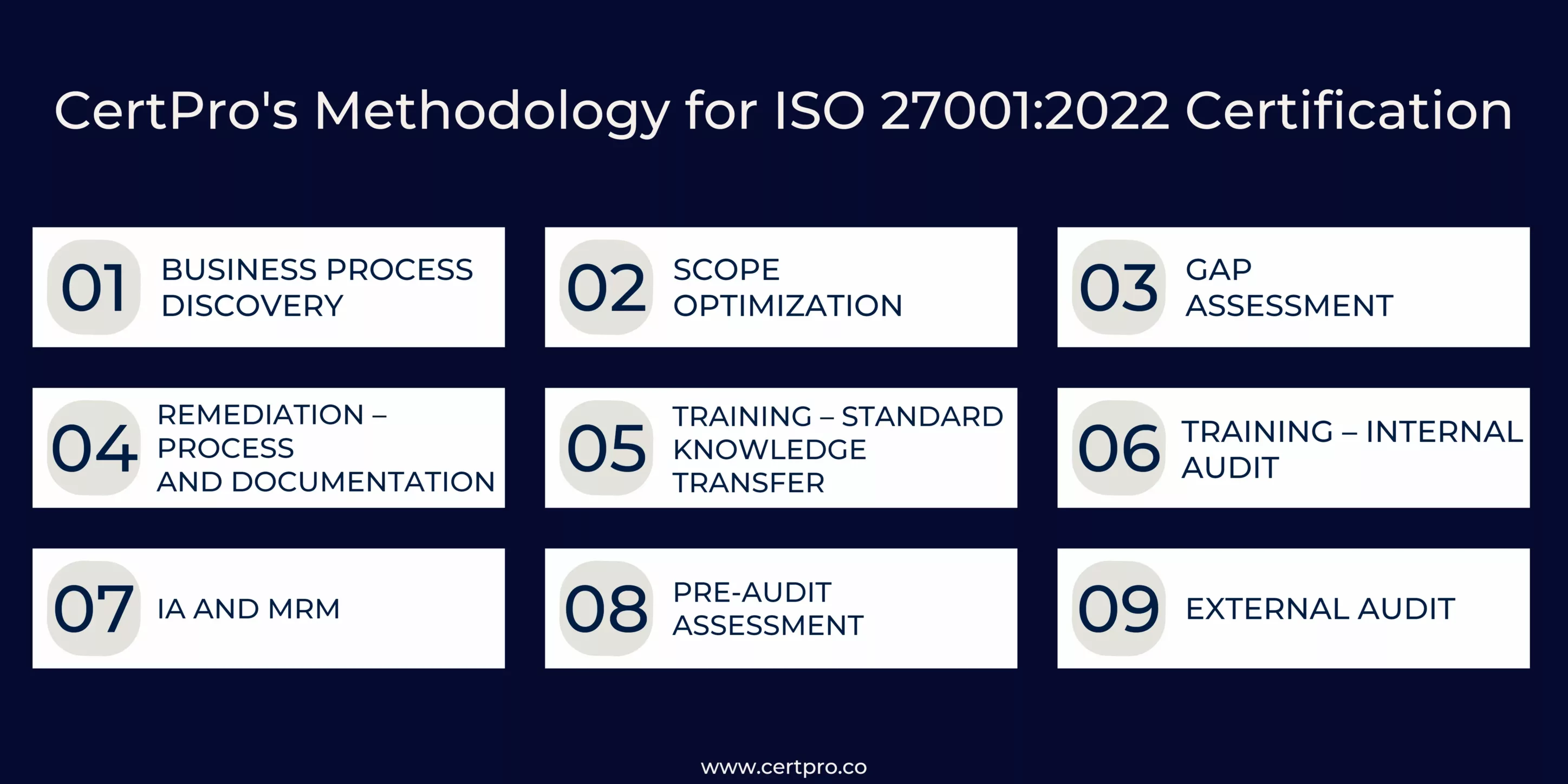
Challenges and Solutions in ISO 27001 Certification
Common challenges organizations may face during ISO 27001 certification:
- A lack of support and dedication from upper management.
- Insufficient resources, including budget and personnel.
- Resistance to change and a lack of awareness among employees.
- Difficulty in understanding and interpreting the standard’s requirements.
- Limited experience in risk management and information security.
- Misalignment of information security objectives with overall business goals
Solutions and strategies to overcome challenges:
- Secure buy-in from senior management and establish a clear plan and budget.
- Hire or train personnel with the necessary skills and experience.
- Develop a comprehensive communication and training plan for employees.
- Engage external consultants or auditors to provide guidance and expertise.
- Align information security objectives with overall business goals.
- Continuously monitor and evaluate the effectiveness of the information security management system.
Best practices for maintaining certification:
- Conduct regular internal audits and risk assessments.
- Continuously update and improve the information security management system.
- Ensure ongoing employee awareness and training.
- Stay up-to-date on changes to the ISO 27001 standard and regulatory requirements.
- Regularly review and evaluate the effectiveness of the information security program.
CertPro: Your Guide to Achieving ISO 27001 Certification
CertPro is a global company of auditors and consultants with more than ten years of experience in delivering complete solutions for compliance auditing, consulting, and certification needs. Their comprehensive range of services can help businesses become ISO 27001 certified, including gap analysis, risk assessment, documentation, implementation, and internal and external audits. With their team of experienced professionals, CertPro can guide organizations through the certification process and provide ongoing support to help them maintain their certification and stay up-to-date with changes in the standard. By partnering with CertPro, businesses can benefit from enhanced information security, compliance with regulatory requirements, and an improved business reputation. With their expertise and knowledge, CertPro can add maximum value to any organization looking to achieve ISO 27001 standards.
FAQ’s
What is information security risk assessment in an organization?
Information security risk assessment is the process of identifying, evaluating, and prioritizing potential security risks and threats to an organization’s information assets. This involves analyzing the likelihood and impact of potential security incidents and vulnerabilities to determine the level of risk and the appropriate mitigation measures.
The risk assessment process typically includes several steps, including asset identification, threat identification, vulnerability assessment, risk analysis, and risk evaluation. These steps involve identifying and classifying information assets. identifying potential threats to those assets, assessing the vulnerabilities of the assets, and analyzing the potential impact and likelihood of security incidents.
The goal of information security risk assessment is to identify the most significant risks to an organization’s information assets and develop strategies to mitigate those risks. This helps organizations enhance their information security posture and protect against potential cyber-attacks, data breaches, and other security incidents.
What is the difference between ISO 27001 certification and ISO 27001 compliance?
ISO 27001 certification is a voluntary process in which an organization seeks to become certified against the ISO 27001 standard. This involves a comprehensive audit and assessment of the organization’s information security management system (ISMS) to ensure that it meets all the requirements of the standard. Once certified, the organization can demonstrate to stakeholders, customers, and partners that it has a robust ISMS to manage information security risks.
ISO 27001 compliance refers to the organization’s ability to adhere to applicable laws, regulations, and industry standards related to information security. Compliance can be mandatory or voluntary, depending on the jurisdiction or industry. Organizations that comply with regulations and standards can avoid legal penalties, reputational damage, and loss of business.
How to get ISO 27001 certification, and how long is the certification valid once it is obtained?
To attain ISO 27001 certification, an organization must establish an Information Security Management System (ISMS), conduct a risk assessment, implement necessary controls, and undergo an audit by an accredited certification body. Once certified, the validity typically lasts for three years. To maintain certification, regular surveillance audits and a recertification audit every three years are required, ensuring ongoing compliance with ISO 27001 standards.
What is the difference between ISO 27001 and other information security standards?
ISO 27001 is a comprehensive standard for information security management systems (ISMS), which provides a framework for establishing, implementing, maintaining, and continually improving an organization’s information security management. It is a generic standard applicable to all types of organizations and industries. On the other hand, other information security standards, such as NIST, PCI DSS, HIPAA, and GDPR, are more specific and targeted toward particular industries or types of information. While they may overlap with ISO 27001 in some areas, they do not provide the same holistic approach to information security management as ISO 27001.
How can ISO 27001 certification benefit small and medium-sized businesses?
ISO 27001 certification can benefit small and medium-sized businesses (SMBs) in several ways. First, it can enhance the organization’s information security posture and reduce the risk of cyberattacks or data breaches. Second, it can help SMBs comply with legal and regulatory requirements related to information security. Third, it can improve customer trust and credibility, which can lead to increased business opportunities and revenue. Finally, ISO 27001 certification can help SMBs identify and address information security gaps and vulnerabilities, which can lead to cost savings and operational efficiencies.
IS SOC 2 THE SAME AS ISO 27001?
In today's digital landscape, ensuring the safeguarding of client data is paramount for businesses. Adhering to recognized compliance standards is vital to meeting this demand. ISO 27001 vs. SOC 2 represent two prominent benchmarks in the realm of data security with...
WHO NEEDS ISO 27001 CERTIFICATION AND WHY?
The esteemed ISO 27001 security framework is designed to evaluate the effectiveness of an organization's Information Security Management System (ISMS) in safeguarding its data. Obtaining ISO 27001 certification is a practical way for a corporation to demonstrate its...
IS ISO 27001 RISK ASSESSMENT VITAL FOR SECURITY MEASURES?
The ISO 27001 standard provides a framework for information security, highlighting the importance of a thorough risk assessment procedure. Organizations use the methodical and complex ISO 27001 risk assessment process to identify and assess information security...

